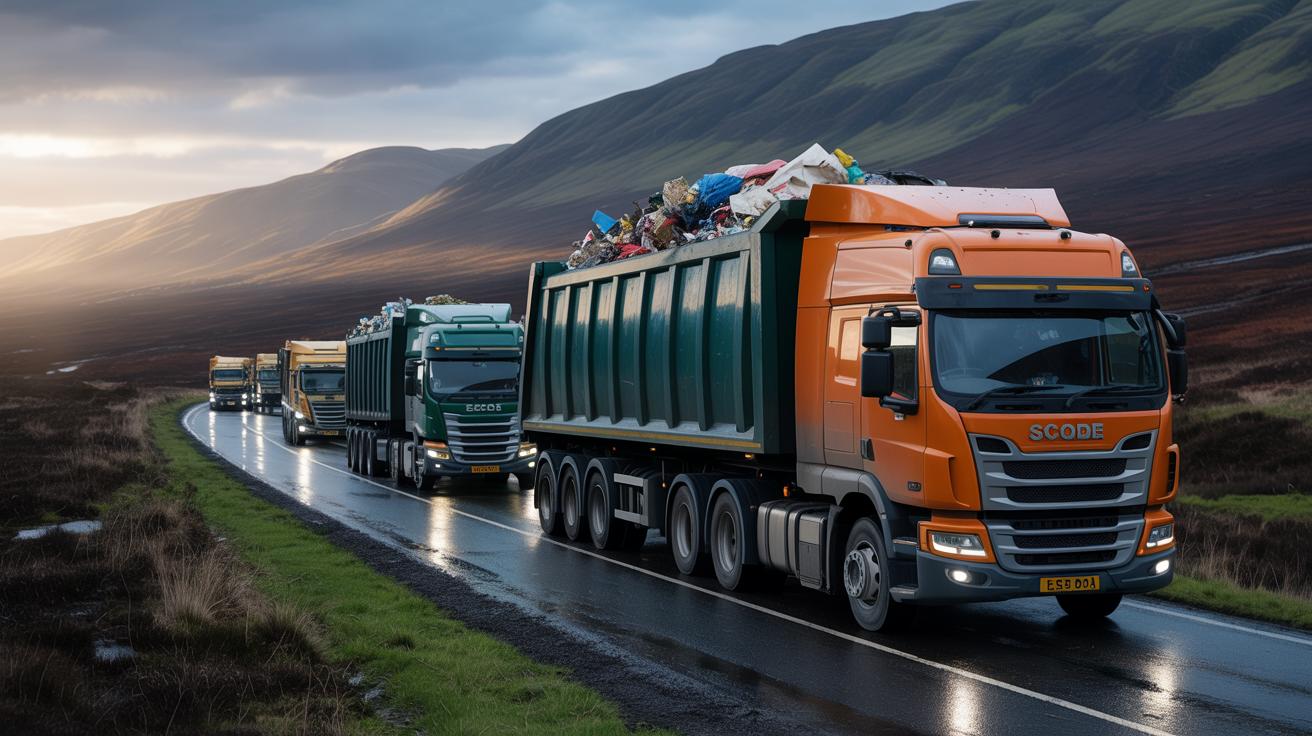What You Need to Know
- 🗑️ Scotland’s Landfill Ban: Starting December 31, 2023, Scotland will prohibit “black bag” waste from being deposited in landfills to reduce methane emissions.
- 🚛 Massive Waste Transport: Up to 100 truckloads of waste will be transported daily from Scotland to England due to insufficient incineration facilities.
- 🌍 Environmental Concerns: While the landfill ban aims to lower greenhouse gases, the transportation of waste raises issues about increased carbon emissions.
- 🔧 Logistical Challenges: The large-scale waste export operation faces potential hurdles, including the availability of trucks and drivers to manage the volume.
- 🔄 Future Waste Management Plans: Scotland plans to enhance recycling rates and expand energy-from-waste facilities to create a more sustainable and circular economy.
In a significant environmental shift, Scotland is preparing to export an unprecedented amount of its waste to England, following a landfill ban effective December 31, 2023. This move, driven by the need to reduce greenhouse gas emissions, highlights the challenges in waste management faced by nations worldwide. The decision to transport up to 100 truckloads of waste daily underscores the urgency of finding sustainable solutions while balancing environmental priorities and logistical constraints. As Scotland embarks on this ambitious plan, it brings to light the broader implications of waste management policies and the complexities involved in executing such large-scale operations.
Scotland’s Landfill Ban: A New Era in Waste Management
The Scottish government’s landfill ban marks a pivotal moment in the country’s environmental policy. Effective December 31, 2023, this ban prohibits the disposal of “black bag” waste in landfills, aiming to significantly reduce methane emissions. Methane, a potent greenhouse gas, is a major contributor to climate change, and this initiative represents a bold step towards mitigating its impact.
However, the ban also exposes a critical gap in Scotland’s waste management infrastructure. With insufficient incineration facilities to handle the increased demand, the government has resorted to exporting waste to England as a short-term solution. This approach, while necessary, raises questions about the long-term viability and environmental impact of transporting waste across borders.
By confronting these challenges head-on, Scotland sets a precedent for other nations grappling with similar issues. The landfill ban underscores the need for innovative solutions and increased investment in sustainable waste management practices.
The Logistics of Waste Transportation
Transporting up to 100 truckloads of waste daily from Scotland to England is no small feat. This logistical undertaking requires a well-coordinated effort to ensure that waste is efficiently and safely delivered to its destination. According to experts, this operation could involve transporting waste as far as Manchester, depending on available facilities.
However, the undertaking is not without its challenges. Environmental concerns arise from the increased emissions associated with long-haul transportation. Moreover, logistical constraints such as the availability of trucks and drivers could hinder the process. Alasdair Meldrum, director of waste management consultants Albion Environmental, highlights the potential lack of resources to move such large quantities of waste effectively.
While the immediate focus is on managing this transition, the situation emphasizes the need for a more sustainable approach to waste disposal. Scotland must address these logistical hurdles to achieve its environmental goals and pave the way for a more efficient waste management system.
Environmental Implications of Waste Export
The decision to export waste to England raises significant environmental considerations. While the landfill ban aims to reduce methane emissions, the transportation of waste introduces new challenges. The increased use of heavy vehicles for long-distance transport contributes to carbon emissions, potentially offsetting some of the intended environmental benefits.
Gillian Martin, cabinet secretary for Climate Action and Energy, argues that temporarily transporting waste is preferable to continued landfill use. However, environmental groups express concerns about the long-term implications of this approach. The tension between immediate needs and sustainable practices underscores the complexity of balancing environmental priorities.
The situation calls for a reevaluation of waste management strategies to minimize environmental impact while achieving policy objectives. By addressing these concerns, Scotland can lead by example in developing comprehensive solutions that align environmental goals with practical realities.
The Future of Waste Management in Scotland
Looking ahead, Scotland’s waste management strategy must evolve to meet the demands of a changing landscape. The government has outlined plans to increase recycling rates and expand energy-from-waste facilities, reducing reliance on landfill sites and minimizing environmental impact.
However, progress has been slow, with recycling rates showing only marginal improvements over the past decade. To achieve its ambitious goals, Scotland must invest in infrastructure and technology to support sustainable waste management practices. Initiatives such as the deposit-return scheme for cans and plastic bottles demonstrate the government’s commitment to creating a circular economy.
As Scotland navigates this critical juncture, the success of its waste management strategy will depend on its ability to adapt and innovate. By addressing current challenges and fostering collaboration among stakeholders, Scotland can set a new standard for environmental responsibility.
As Scotland embarks on this transformative journey, the stakes are high for its waste management policies. The decisions made today will shape the country’s environmental future and set a precedent for others to follow. How can Scotland balance the immediate need for waste disposal with the long-term goal of sustainability, and what lessons can other nations learn from its experience?
Did you like it?4.5/5 (23)








10 comments
Daniel_Whispering
This is a huge undertaking. Are there any environmental groups involved in overseeing the impact of this waste transport?
thomas_tranquility
lol, imagine being stuck behind one of those waste trucks on the highway! 🚛💨
Sebastian
Scotland’s strategy is ambitious! I wonder how other countries are dealing with similar waste management issues.
charlotte
Transporting waste to England doesn’t seem like a long-term solution. What are the plans to improve waste infrastructure in Scotland?
jackson3
Good read, but shouldn’t we focus on creating less waste rather than just moving it around?
GingerElysium
100 trucks a day sounds like a logistical nightmare. Are there enough drivers for this operation?
claire_raven0
Scotland’s landfill ban is a bold move! But how will they ensure the emissions from transportation don’t outweigh the environmental benefits?
HaleyDestiny9
Why not invest that money into building more incinerators in Scotland instead of transporting the waste?
OreoFrost
Thanks for sharing this article. It’s eye-opening to see the lengths Scotland is going to achieve environmental goals. Hope they find a sustainable solution soon!
diego
Wow, 100 truckloads a day! That’s a lot of traffic. Is there even enough road space for all those trucks? 😅